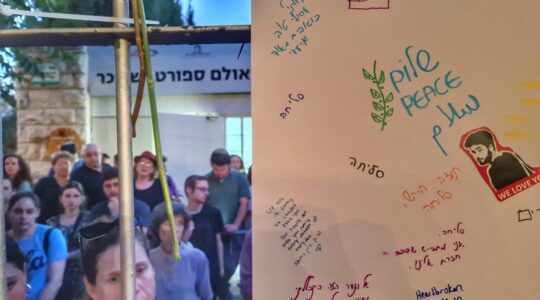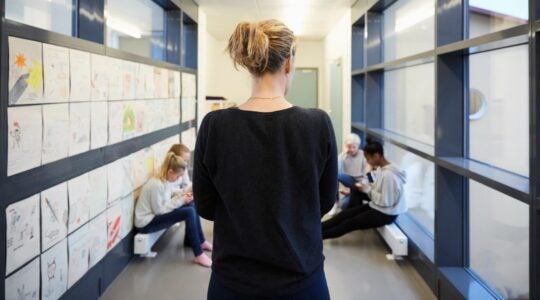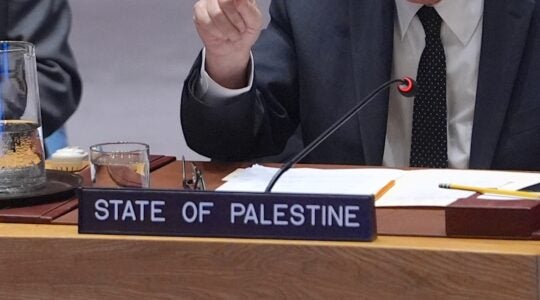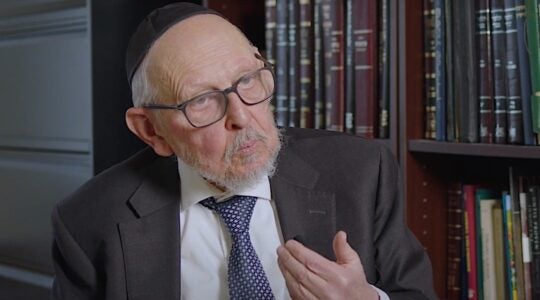Tensions between Israel’s Jewish and Arab citizens have risen dramatically in the wake of the Gaza war last summer and the recent violence in and around Jerusalem, especially the murderous attack on the synagogue in the Har Nof neighborhood. This is not unexpected. Those who carried out the synagogue attack came not from Gaza or the West Bank, but from Jerusalem.
Backlash to the Har Nof attack has included the firing of some Israeli Arab citizens from their jobs, which prompted Prime Minister Netanyahu to warn that there is “no place for discrimination against Israeli Arabs,” adding “most Arabs citizens of Israel are law-abiding.” Sporadic acts of violence against Arabs also have been reported.
In terms of last summer’s war in Gaza, it must be remembered that Israel’s Arab citizens are also Palestinians, and they identity with those Palestinians who live on the other side of the Green Line and in Gaza. Many Arab citizens have family and friends in Gaza, and, therefore, were naturally concerned for their safety. Arab protests, while understandable in this context, nevertheless were viewed by Israel’s Jewish majority as signs of disloyalty.
The most serious clash with Israel’s Arab citizens occurred in October 2000 when, during the period of the second intifada, 12 Israeli Arab rioters were killed by police. The Or Commission, which was set up to investigate these events, concluded that the police were unprepared and deployed excessive force. More broadly, it noted that Arab citizens suffer discrimination, which led to the outpouring of anger. The commission urged the government to take immediate, medium- and long-term actions to close gaps in education, housing, industrial development, employment and services.
Police behavior this past summer came under criticism by Arab officials and civil society activists, who accused the police of failing to respond when Arab demonstrators were mistreated. At the same time, there seems to be widespread agreement that the police behaved much more responsibly than they did in October 2000 — as a result of internal processes the force underwent following the Or report. No one was killed during the period of unrest last summer.
But looking at this issue through a broader lens, what about the sizable educational and socioeconomic gaps pointed to in the Or Report? There is still much work to be done. In a remarkable speech delivered on Oct. 26 as part of a memorial ceremony at the site of a massacre of Arabs by Israeli border guards at Kafr Qasim, Israel’s new president, Reuven Rivlin, said, “We must state plainly: the Israeli Arab population has suffered for years from discrimination in budget allocation, education, infrastructure and industrial and trade areas. … Poverty and a sense of deprivation provided breeding ground for nationalist and religious extremism, and we ourselves fan these flames when we do not insist upon the principle of equality between citizens of the state of Israel.”
According to Ayman Seif, director of the Authority for the Economic Development of the Arab, Druze and Circassian Sectors in the Prime Minister’s Office, and an Arab himself, 51.4 percent of the country’s Arab families and 62.5 percent of Arab children live under the poverty line, compared with 15 percent of Jewish families and 23.8 percent of Jewish children.
After 2,000 years of being governed by others in diaspora lands, often with terrible consequences for our people, in Israel we, the Jewish people, have been restored to sovereign status. Israel’s Declaration of Independence gets it right: The State of Israel “will foster the development of the country for the benefit of all its inhabitants. … It will ensure complete equality of social and political rights to all its inhabitants irrespective of religion, race or sex…” The time has come, in fact it is long overdue, to deliver on this pledge.
Last Sunday, the Israeli cabinet approved a controversial — potentially even coalition busting — bill, which would enshrine in the form of a basic law Israel’s identity as nation state of the Jewish people. Critics, including the attorney general, argue that it diminishes Israel’s democratic character and that it should be substantially amended or withdrawn altogether. Needless to say, it is vigorously opposed by leadership of the Israeli Arab community. I would argue that there is nothing wrong, in principle, with a basic law that recognizes Israel’s core Jewish identity. But it would have to be crafted in such a way that guarantees equal rights for all of the country’s citizens, as referred to above in the Declaration of Independence, and, more generally, sends a clear message that the sensibilities of the minority are respected and valued.
In November 2008, shortly after Barack Obama was elected president of the United States, I was visiting Israel with leaders of my organization, the Jewish Council for Public Affairs. One of our stops was at the Hand-in-Hand school in Jerusalem, which brings together Jewish and Arab children in an integrated curriculum with both Hebrew and Arabic being used interchangeably. Needless to say, the precedent-setting election of America’s first African-American president was sending ripples throughout the world, including in Israel and the Middle East.
While chatting with the elementary school children in Hebrew, an adorable little Arab girl looked up at me and with the innocence of childhood asked, “Do you think it would ever be possible for me to be elected prime minister of Israel?” I didn’t quite know what to tell her. I said, “Who knows? Maybe it will be possible,” knowing full well that the likelihood of it happening is remote, to say the least.
I do not know whether the day will ever come when an Arab could be elected prime minister. But what I do know is that Israel and we the Jewish people have every responsibility to make sure that little girl, now a teenager, grows up to be a successful citizen of the state of Israel, educationally, socially and economically.
In his Kafr Qasim speech, Rivlin also said, “The most difficult and important challenge which lies before us is the need to deal with the suspicion, hatred and hostility between communities. Here there are no shortcuts. A lack of familiarity between the two sides’ language and culture will always lead to misunderstanding.”
I wholeheartedly agree with President Rivlin about the importance of culture and language. That is why I have chosen to study Arabic at Rutgers University, quite a challenge at any age, let alone mine. The next time I visit a Hand-in-Hand school, I hope to be able to speak with the Arab children in their native language.
Martin J. Raffel recently retired as senior vice president of the Jewish Council for Public Affairs (JCPA). He now consults for the JCPA and for the Israel Policy Forum.
The New York Jewish Week brings you the stories behind the headlines, keeping you connected to Jewish life in New York. Help sustain the reporting you trust by donating today.




